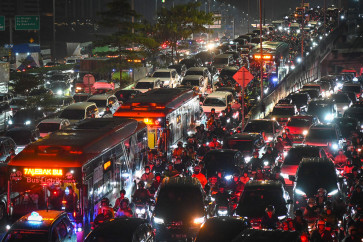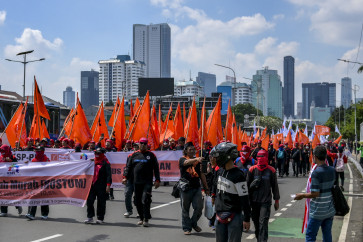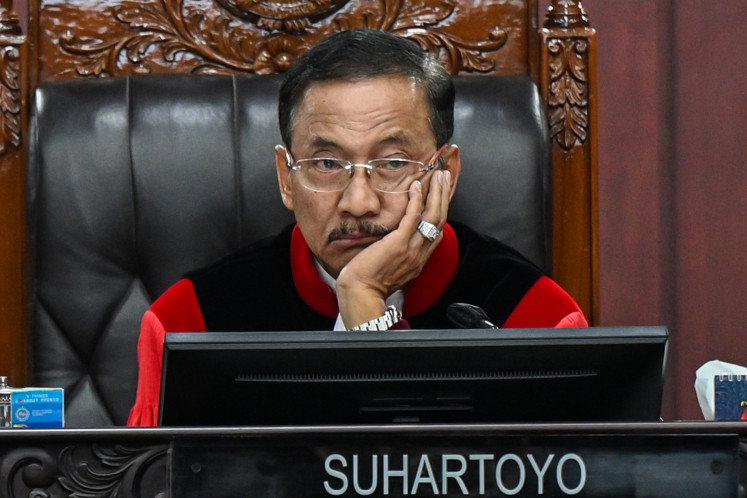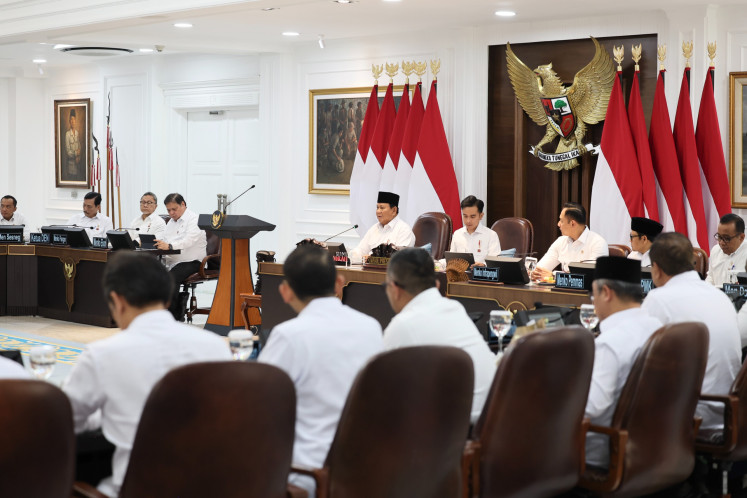Popular Reads
Top Results
Can't find what you're looking for?
View all search resultsPopular Reads
Top Results
Can't find what you're looking for?
View all search resultsRisks loom in Jokowi's pro-growth obsession
President Joko âJokowiâ Widodo has been warned that his obsession with a 7-percent growth target might not go down well with foreign investors, who expect the government to prioritize economic stability amid mounting external risks
Change text size
Gift Premium Articles
to Anyone
P
resident Joko 'Jokowi' Widodo has been warned that his obsession with a 7-percent growth target might not go down well with foreign investors, who expect the government to prioritize economic stability amid mounting external risks.
For Indonesia to post 7 percent economic expansion 'is not a holy grail' among international economic stakeholders, who would prefer to see the government improve the current account deficit first rather than push up economic growth, said Thomas Rookmaaker, a director of sovereign ratings with Fitch Ratings.
'High growth means a high current-account deficit,' he said in an economics seminar held in Jakarta on Thursday. 'If you can make sure you have a stable macroeconomic situation that could lead to higher potential growth that would be [more] beneficial.'
Fitch Ratings, an international ratings agency that is dual-headquartered in the US and the UK, upgraded Indonesia to investment grade in 2011, after the country lost the prestigious status in the aftermath of the 1997-1998 Asian financial crisis.
Rookmaaker identified several weaknesses in Indonesia's domestic fundamentals, with the country particularly faring relatively weakly in aspects such as external finances and business environment, compared to similarly rated countries in the investment grade category.
Countries rated by Fitch in the BBB- investment grade category include Aruba, Azerbaijan, Bulgaria, India, Morocco, Namibia, the Philippines, Romania, Turkey and Uruguay.
'Indonesia's external finances overall compare unfavorably with its peers, which makes the country relatively vulnerable to a generally sustained deterioration in investor confidence in emerging markets,' Fitch Ratings analysts wrote in a report distributed during the seminar.
The deficit in the current account, the broadest measurement of international trade, has become the main concern among foreign investors looking at Indonesia, especially as the country has posted a deficit for 13 consecutive quarters since 2011.
Bank Indonesia (BI), the central bank, has estimated that this year's deficit could stand at between 3 and 3.1 percent of gross domestic product (GDP) this year, compared to 2.95 percent last year.
The rupiah this year has fallen by more than 4.6 percent, among the worst performers in Asia, as it fell victim to negative external sentiment stemming from economic woes in China and Europe, in addition to uncertainty over interest rate hikes in the US.
However, amid mounting risks in the global economy, Indonesia is expected to see further ballooning in the current account deficit due the government's ambitious push for growth with its massive infrastructure development plan, which could draw an even stronger influx of imports.
Incremental infrastructure-related import demand could enlarge Indonesia's current account deficit by 0.6 percent of GDP annually, according to calculations from Helmi Arman, the chief economist of Citibank in Indonesia.
The incremental deficit would be spread out, starting in the second half of 2015 with imports of construction materials, before accelerating further into 2016 with machinery imports needed for sophisticated projects such as power plants, Helmi explained in a recent report distributed to clients.
'We believe that macro stability will continue to take precedence over growth in 2015 for BI,' read a report written by analysts from Morgan Stanley, which last year labeled Indonesia on its list of 'Fragile Five' economies most vulnerable to outflows due to its high current account deficit.










